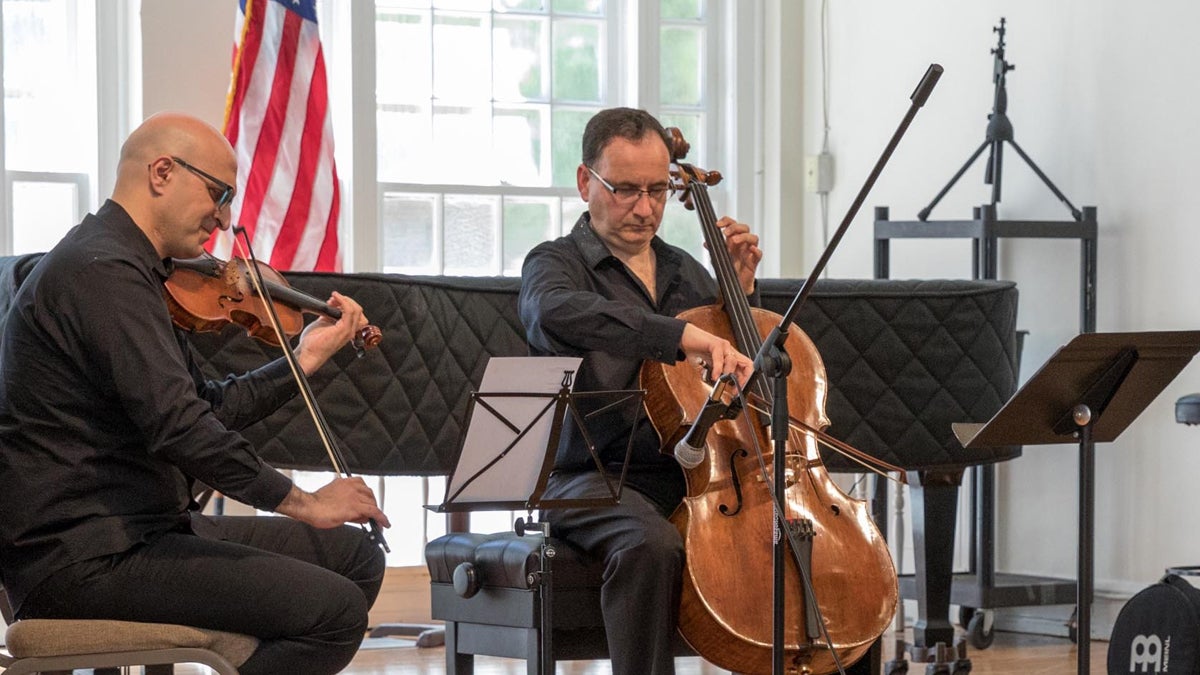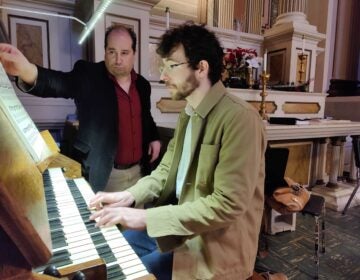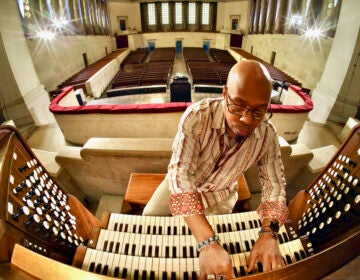Everyone’s talking. Is anyone listening?

Hanna Khoury, an Israeli Arab, plays violin, and Udi Bar-David, an Israeli Jew, plays cello. (Stacia Friedman
A Jew and two Arabs walk into a room. They play beautiful music together, erasing the cultural, political, and religious boundaries that normally separate them. What is wrong with this picture? According to cellist Ohad “Udi” Bar-David, absolutely nothing.
For over 20 years, through all the Intifadas, terrorism, wars, and genocide, Bar-David has stood firm in his belief that the way to resolve our differences is not with walls and drones but with our ears. If we could just learn to listen — with respect and an open mind — to people who do not share our beliefs, we would not need guns and nuclear warheads to feel safe.
Last week, while Trump was selling billions in military hardware to the Saudis, Bar-David was trying to change hearts and minds in Philadelphia. He took the stage at the Ethical Society with two other musicians and, without any introduction or explanation, led the audience on a musical tour of the Middle East. Haunting Jewish melodies transition seamlessly into plaintive Arab compositions. Joyful klezmer tunes dance cheek to cheek with Palestinian songs.
After the audience bought into the music, Bar-David put down his cello and introduced the trio. “I am an Israeli Jew,” he said. “Our violinist, Hanna Khoury, is an Israeli Arab. Our percussionist, Hafez Javier Kotain, is a native of Syria and Venezuela.” He let that sink in.
Hosted by the American Jewish Committee, the predominantly Jewish audience was curious. How did a “nice Jewish boy” come into contact with Arabs? Bar-David recalled a time when it was unthinkable.
“When I was growing up in Tel Aviv, I didn’t even look at Arabs. They were the enemy,” he said. “But as I traveled outside of Israel and performed around the world, I discovered that music gave us a common language.” Eventually, Bar-David who is a member of the Philadelphia Orchestra, developed an interest in the other music of his native land. “I wanted to learn Arab music, which is much more complex than western music.”
Next, Hanna Khoury described growing up in a Palestinian village in the north of Israel. “The first Jewish Israeli I met was my violin teacher. I was 7. At that age, you do not question. You accept.”
The three had met the way all musicians meet: at a gig. Ironically, it was at a Latin music event. (Having lived in Syria and Venezuela, Kotain is fluent in both Latin and Arab rhythms.) Kotain introduced Bar-David to Khoury, and they took their act on the road. Literally. In recent years, Bar-David and Khoury have brought ARTolerance to Palestinian villages and Israeli military bases and schools. This is nothing new for Bar-David who is also the founder, president and artistic director of Intercultural Journeys, a non-profit organization based in Philadelphia committed to peaceful co-existence through the arts.
Bar-David asked for a show of hands: “How many of you have met an Arab before?” Several hands, including mine, went up.
Then he asked, “How many have never met an Arab?” Just as many hands waved in the air. And who knows how many abstained?
This question was the primary point. And it made me wonder. Not just about Arabs and Jews. But what about blacks and whites? Republicans and Democrats? We see one another in school and in the workplace, but do we really listen to one another’s stories? Do we sit down and break bread?
I live in Mt. Airy, one of the oldest, most successfully integrated neighborhoods in the nation. We pride ourselves on our liberalism. But, recently, a neighbor confided, “Blacks and white live on the same street for years without ever entering one another’s homes.” Sure, we mingle as we go about our day, just as Arabs and Jews mingle in the streets of Israel. But do we really connect?
Bar-David closed the concert by encouraging the audience to open up to the opinions of people whom they consider The Enemy. “Suspend your judgment and look for the commonalities you share,” he said. I overheard a woman mutter, “Right. Try that with a Trump supporter.”
Maybe she should.
WHYY is your source for fact-based, in-depth journalism and information. As a nonprofit organization, we rely on financial support from readers like you. Please give today.




